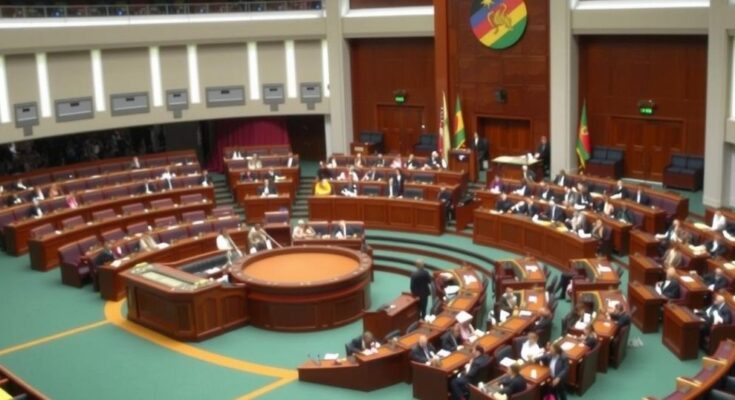Mozambique will inaugurate its new parliament despite protests over alleged election fraud. Venancio Mondlane claims he won the presidency, while others, including Renamo and MDM, plan to boycott the swearing-in ceremony. The unrest has resulted in significant casualties and economic consequences, underscoring a critical need for political resolution.
Mozambique is poised to swear in its new parliament on Monday, following an October election marked by allegations of rigging and widespread protests. Opposition leader Venancio Mondlane has urged his constituents to engage in peaceful demonstrations from Monday through Wednesday, coinciding with the expected inauguration of Daniel Chapo as president. Mondlane contends that he won the presidential election, asserting that the official results unjustly favored Chapo’s ruling Frelimo party, which has maintained power for five decades.
Two opposition parties, the Mozambican National Resistance (Renamo) and the Democratic Movement of Mozambique (MDM), plan to boycott the parliamentary session, voicing their dissent over what they describe as a lack of credible elections. Renamo secured 28 of the 250 parliamentary seats, while MDM obtained eight. Renamo representative Marcial Macome condemned the inaugural ceremony, calling it “a social outrage and a lack of respect for the will of Mozambicans,” who he claims were denied free and fair elections.
Mondlane, supported by the Podemos party, asserts that he received 53 percent of the votes, in stark contrast to the official results which attribute only 24 percent to him, against Chapo’s 65 percent. After spending over two months in exile, Mondlane returned last week to assert his claims to the presidency, resulting in protests that resulted in clashes with security forces, leaving at least three individuals dead, according to election monitoring groups.
Among the protests, Mondlane has called for a national strike and peaceful mobilization against what he perceives as a betrayal of the electorate’s will. “Let us demonstrate against the inauguration of those who betrayed the will of the people,” he declared in a social media post.
Recent unrest in the country has led to significant casualties, with a local rights organization reporting around 300 lost lives, attributable to confrontations with security forces who have allegedly employed excessive measures. The resulting turmoil has severely disrupted Mozambique’s economy, halting trade and impacting key sectors such as shipping and mining.
The current political climate in Mozambique is fraught with tension following the controversial October elections. The ruling Frelimo party has been in power for 50 years and has faced allegations of electoral manipulation. The disputes have led to widespread protests, significantly impacting the country’s social fabric and its economy. Historical rivalries between the Frelimo party and opposition groups like Renamo continue to shape Mozambique’s political landscape, complicating the possibility of a peaceful resolution to the current crisis.
In summary, Mozambique is on the verge of swearing in a new parliament amidst significant political unrest and accusations of election rigging. Opposition leaders are urging peaceful protests and boycotts in response to the disputed election results. The ongoing tensions not only threaten the stability of the political environment but also risk further economic disruption, reflecting the urgent need for resolution and reform regarding the electoral process in the nation.
Original Source: www.voanews.com




